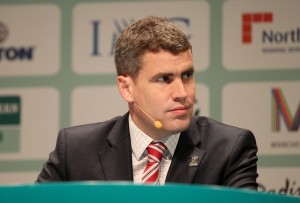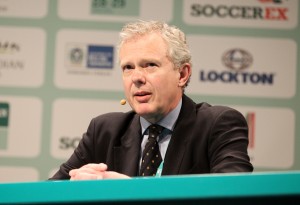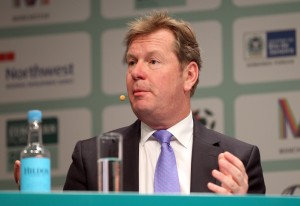Soccerex European Forum – Manchester (March 2012): The Financial Management of Clubs
Day 2 – Thursday 29 March 2012
10:00 – 11:00 The Financial Management of Clubs
- Dan Jones (Partner, Deloitte) [Moderator]
- Philip Beard (CEO, QPR)
- Trevor Birch (PKF International, appointed Administrator Portsmouth FC)

Dan Jones started the debate by asking Trevor Birch, whether he thought football was in a strong position or in financial crisis. Birch responded that it was a case of a bit of both, in that the Premier League was an incredibly successful export, but that as you moved down the League’s (and the Championship in particular), the picture was less rosy. He said that there were currently 5 or 6 Championship teams spending 100% of their revenue on players wages. Philip Beard said that a club finances were no different to the individual, in that if the debt could be serviced all well and good, but people had to live within their means. When teams chase the ‘Holy Grail’ that is the Premier League and are subsequently relegated, the business model has to be adjusted accordingly.
The next question from Dan Jones was with regard to whether football had been affected by the plight of the current economy. Trevor Birch said that for those clubs with a ‘Benefactor’, their situation was pretty much unchanged. However, the economy had hit football with sponsorship revenues and crowd attendances down. Birch added that Corporate Hospitality was down 20-30%, but that if there was success on the pitch, this was reflected off it. Philip Beard added that even in tough times, people needed entertainment and football had to ensure that it was entertainment of choice for people. This meant providing an experience on the pitch and around it, for instance using the stadium more than just on match days. Beard said that football has to work harder to generate revenues.
Philip Beard was asked by Dan Jones whether it had been difficult not having a football background before his role at QPR. Beard said that football and the business at the O2 (his previous role was as Chief Executive) were both about the talent. He reiterated though, that football had to ‘sweat its assets’ in the future, using its facilities for other things. Trevor Birch picked up on the entertainment and football analogy and said that the difference was that you can’t control football to the extent of a concert. Football is about what happens on the pitch and this ultimately affects success. He added that by making a mistake with buying a player or having a contract that doesn’t work out, millions can be lost and trying to find a sponsorship that generates money to cover that is difficult. Beard then spoke of his desire for a Premier League without relegation and cited the system of professional sport in America as the way forward.
UEFA’s Financial Fair Play (FFP) rules were the next topic for the panel. Trevor Birch believed that the principles are right, but added that it would be interesting to see how the penalties work and the way they are implemented. However, if it produced a more level playing-field, then ‘yes’ Birch agreed it was a good idea. Philip Birch maintained that football needs to be seen to be fairer, and cited FC Barcelona and Real Madrid in Spain who were able to negotiate their own television rights which gave them incredible financial muscle (and therefore advantage) over the rest of the teams in La Liga.

In terms of a Salary Cap, Trevor Birch said that it would be in best interests of the Premier League to do this. He praised Arsenal FC for the way they had their ‘financial house’ in order, in that they had a new stadium and had remained competitive without causing financial meltdown. Philip Beard reiterated that clubs had to live within their means and that the FFP would slow down the ability to pay ‘big-end’ prices and increase the need for a club Academy to produce more talent.
The panel were asked whether the Premier League could learn anything from the Bundesliga. Trevor Birch said that one of the issues the League didn’t have to deal with is that of benefactors, since in Germany they have the 50+1 rule whereby a minimum of 51% of the club must be owned by club members. This means a business can invest in a club, but prevents them from having overall control. The club board is made up of delegates selected by the shareholders. In this model the supporter membership associations have a direct input into the way the club is run. In addition the sponsorship and licensing system is strong, but is unable match the Premier League in media terms. Philip Beard said that as a model it ‘ticked many boxes’ and acknowledged that many German internationals preferred to play in the Bundesliga and that the clubs provided a League that was more competitive than its English counterpart. However, he reiterated Trevor Birch’s point that the Bundesliga did not have the global profile of the Premier League.
Trevor Birch was asked about the situation at Portsmouth FC. He replied that the club had suffered due to a succession of broken promises, some of which came from ‘benefactors’. Currently Portsmouth were trying to pay Premier League wages with Championship level revenues and said that it was difficult to move players on because of their high salaries, especially outside of the transfer window. Philip Beard was asked about QPR’s current plight and he responded that whatever division the club was playing in next season, the aim is to create a long-term position. This would include new training facilities and stadium which would have greater use and therefore revenue generation.

The panel was asked if the way Blackpool FC has approached their time in the Premier League was a model for other clubs. Trevor Birch acknowledged that to an extent what Blackpool achieved was a success story. However, different clubs approach promotion in different ways such as Burnley FC. Birch did not believe that there is one definitive model. Philip Beard suggested that Norwich City FC are currently another good model. He added the ideal is to have a situation which is stable and sustainable, with clubs holding onto players if they were relegated. However, this was not helped by Agents trying to renegotiate contracts, but he said that in the business world people move if offered a better position, so why shouldn’t it apply to football as well.
With QPR having an artificial pitch back in the 1990’s, Philip Beard was asked whether he could see one of the new generation of artificial surfaces returning to Loftus Road. Beard said that his preferred option would be a surface that could be moved in and out, whether being rolled-up or moved on blocks.
Trevor Birch was asked why he was so against the ‘Benefactor Model’. Birch responded by saying it was not illegal and there was no way of regulating against it, but ultimately that it was a model that is unsustainable in the long-term. He added that you only had to look at the plight of Portsmouth to see what damage the ‘Benefactor Model’ could produce.
The final question to Philip Beard asked whether QPR would ever groundshare (for instance with Chelsea). Beard said how in Europe and America is was common for different teams and even different sports to share stadiums and it made financial sense (in Italy, the Stadio Olimpico is used by Roma and Lazio for football, the Italy national team for rugby union and hosts athletics events). However, he accepted in England there was too much history and emotion for this to happen at the moment. As for a groundshare with Chelsea, that wasn’t on the cards!